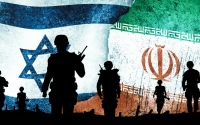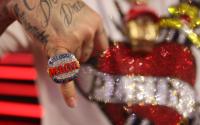Common Dreams / Published on Thursday, April 8, 2004 by ReutersLuke Baker
BAGHDAD - U.S.-led forces in Iraq risk being drawn into an urban guerrilla conflict they are ill-prepared to fight and which will probably cost many more lives, military experts say.
 A masked Iraqi insurgent wields a rocket propelled grenade launcher in the embattled town of Falluja April 8, 2004. U.S.-led forces in Iraq risk being drawn into an urban guerrilla conflict they are ill-prepared to fight and which will probably cost many more lives, military experts say. More than 1,400 U.S. Marines have been sent in to quell insurgency in Ramadi and Falluja, two large Sunni Muslim towns west of Baghdad that have been the focal point of the anti-occupation guerrilla war for the past year. Photo by Akram Saleh/Reuters A masked Iraqi insurgent wields a rocket propelled grenade launcher in the embattled town of Falluja April 8, 2004. U.S.-led forces in Iraq risk being drawn into an urban guerrilla conflict they are ill-prepared to fight and which will probably cost many more lives, military experts say. More than 1,400 U.S. Marines have been sent in to quell insurgency in Ramadi and Falluja, two large Sunni Muslim towns west of Baghdad that have been the focal point of the anti-occupation guerrilla war for the past year. Photo by Akram Saleh/Reuters |
At the same time, British, Italian, Spanish, Polish, Ukrainian and other forces within the U.S.-led coalition are battling to put down a Shi'ite Muslim uprising that is spreading through towns and cities throughout southern Iraq.
The fighting in Falluja and Ramadi has been particularly intense, with witnesses reporting U.S. troops, supported by helicopter gunships and warplanes, moving in groups on foot to engage masked guerrillas in street-to-street combat.
Early in the operation, dubbed "Vigilant Resolve," 12 Marines were killed and 20 wounded when well-armed insurgents launched a surprise attack on the Ramadi governor's mansion, which was occupied by U.S. forces.
It was one of the heaviest tolls the Marines had suffered in a single day of combat since the war that toppled Saddam Hussein was launched a year ago.
"Urban warfare is the worst type of warfare any infantry can get drawn into and it's something the Americans have wanted to avoid since the beginning," said Phillip Mitchell, an analyst at London's International Institute for Strategic Studies.
"It means going street to street, house to house to defeat the enemy, and if that's going to happen then the Americans are going to take many, many more casualties," he said.
U.S. SAYS FORCES READY
In the past four days of fighting, not just in Ramadi and Falluja but in Shi'ite districts of Baghdad and the southern towns of Nassiriya, Najaf, Kerbala, Kut, Basra and Amara, at least 35 American and allied soldiers have been killed.
Hundreds of Iraqis have also died and many more been wounded in the most intense fighting since Saddam fell.
The commander of U.S. forces in Iraq, Lieutenant General Ricardo Sanchez, told a news conference on Thursday the operations in Ramadi and Falluja could go on for days or weeks.
"We knew before we started this campaign that that was a possibility, and the entire military and the U.S. Marines are prepared to engage in this type of operation," he said.
But some experts say the military is trained more for heavy combat operations using overwhelming force, not the intense cut and thrust of house-to-house combat, and may be underestimating the resolve of insurgents who have kept the 125,000 U.S. troops deployed in Iraq on edge and guessing for more than a year.
There are also concerns that unrestrained firing from edgy soldiers unable to distinguish friend from foe could have serious consequences may only incite more hatred and drive more people to take up arms.
"Neither in terms of doctrine nor training are the Americans likely to be very good at dealing with an urban insurgency," said William Hopkinson, a military specialist and associate fellow at Britain's Royal United Services Institute.
"The sort of fighting they're engaging in is likely to draw more fighters into the insurgency," Hopkinson said.
"The American forces' lack of feeling about the Iraq situation could show up to very bad effect if they are further drawn into an urban conflict."
Hopkinson also worries about the ramifications of the spreading Shi'ite uprising in the south.
Militants loyal to a radical, anti-American cleric have taken control of the holy city of Najaf, nearby Kufa and the city of Kut to the east, where Ukrainian troops have withdrawn from the town center.
Italian troops fought pitched street battles for several hours earlier this week to regain control of Nassiriya.
At some point, Najaf, Kufa and Kut will have to be retaken, meaning heavy fighting. Sanchez said coalition forces were already being redeployed around Iraq to prepare for battle, and promised that the cleric's militia would be destroyed.






